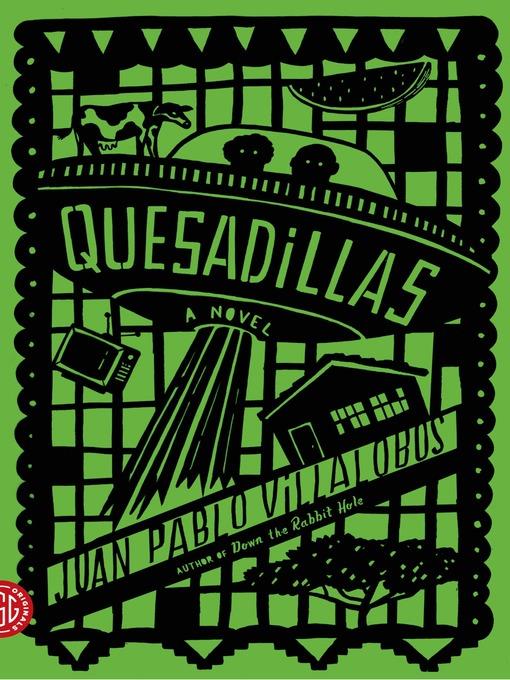
Quesadillas
A Novel
کتاب های مرتبط
- اطلاعات
- نقد و بررسی
- دیدگاه کاربران
نقد و بررسی

Starred review from September 30, 2013
Mexican novelist Villalobos (Down the Rabbit Hole) fuses personal mythologies and political margins in his new novel, a riotous tall tale set in the hills of Cerro de la Chingada and narrated by young Orestes, whose perennial concern, despite his familyâs crippling poverty, is wresting his daily share of his motherâs quesadillas from his six brothers and sisters, âall of them highly qualified strategists in the survival tactics of big families.â Thereâs Aristotle, the eldest; Archilochus; Callimachus; Electra; and the âpretend twinsâ Castor and Pollux, who go missing after a violent rebellion sweeps the countryside. Convinced that theyâve been kidnapped by aliens, Aristotle draws his brother into a search in which the imaginary merges with the realities of destitute backwater Mexico. Calling it magical realism would be lazy, given the undertone of socially conscious indignation that underlies often-fantastical imagery: a highway procession of pilgrims, âan orgy of hysterical cows,â and the pervasive sense of a Greek epic confined to squalor. With tidy, uncompromised prose, Villalobos has inaugurated a new kind of avant-garde novel, one whose grasp of certain dehumanizing political realities never erodes the power to dream something better. Agent: Andrea Montejo, Indent Literary Agency.

December 1, 2013
A political allegory aims for pointed satire but settles for slapstick farce. The author (Down the Rabbit Hole, 2012) writes of a poor family that thinks of itself as middle class, living in a region where "there are more cows than people, more charro horsemen than horses, more priests than cows, and the people like to believe in the existence of ghosts, miracles, spaceships, saints and so forth." All of this figures into the narration of a man remembering his boyhood of 25 years earlier, when he was 13 and the second oldest in a family subsisting totally on quesadillas. The cheap meal provides the titular metaphor for the family's condition and has a wide range of quality and implications: "The normal quesadillas were the ones we would have eaten every day if we lived in a normal country--but if we were living in a normal country we wouldn't have been eating quesadillas and so we also called them impossible quesadillas....Finally you had the poor man's quesadillas, in which the presence of cheese was literary: you opened one up and instead of adding melted cheese my mother had written the word 'cheese.' " Gentrification arrives, initially with a neighboring family of three from Poland, whose large estate presages the development that will threaten the protagonist's family's ramshackle home with demolition. Most of the names in the family are classic Greek, starting with oldest son Aristotle, of whom the narrator complains, "You can't fight for the truth when your rival's name is Aristotle." An exception is a "stoner uncle" known as Pink Floyd, who causes the narrator to lament, "Pink Floyd, how I wish you were here." For all that it has to say about the relationship between the few rich and the many poor in Mexico, the writing is neither as clever nor as funny as it seems to think it is.
COPYRIGHT(2013) Kirkus Reviews, ALL RIGHTS RESERVED.

October 1, 2014
The author of the successful Down the Rabbit Hole combines satire, magical realism, and humor in an episodic flashback of growing up in the politically turbulent 1980s.
Copyright 2014 Library Journal, LLC Used with permission.

December 15, 2013
Orestes, the irreverent adolescent narrator of this surrealist sociopolitical satire, struggles to come to terms with his Mexican family's poverty. His father is a civics teacher (and has given all of his many children classical Greek names), but the family lives, perhaps illegally, in a shack at the Cerro de la Chingada outside of town. Orestes describes the microeconomy of his Mexican family in terms of the fluctuating thickness of the quesadillas rationed by his mother: inflationary quesadillas, devaluation quesadillas, and, of course, poor man's quesadillas, in which the word cheese replaces actual cheese. When two of his younger siblings go missing, Orestes and his fascist-leaning older brother go looking for them, but they also understand that the childrens' absence means more quesadillas for the rest of the family. Orestes veers toward profanity and hyperbole, and the story's plot pivots upon comic absurdities, including invading extraterrestrials and the sexual proclivities of cows; at times, the entire narrative seems in danger of spiraling out of control. But in the end such devices underscore, rather than distract from, this novel's caustic critique of Mexican politics under the Carlos Salinas regime.(Reprinted with permission of Booklist, copyright 2013, American Library Association.)

























دیدگاه کاربران